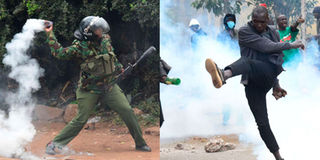Protests will cripple the Kenyan economy

A police officer engages protesters in Kibera, Nairobi, on July 19.
Ever since President William Ruto and Azimio la Umoja Coalition leader Raila Odinga's camps clashed over terms of reference for talks, anxiety is again likely to be back in the country. Constitutionally, protests should be peaceful. The opposition and government should sit down and sort out their differences in the interest of the country
Kenya is suffering after waves of protests and disruptions on the economic fibre of the land. The Azimio followers rioted over grievances like the high cost of living, high taxes and the ‘stolen’ election. Since the beginning of the year, there have been frequent anti-government violent demonstrations called by the Azimio leadership. This has had great negative impact on the land’s economy. Our country is seen abroad as a nation on fire and as such investors have diverted their money elsewhere.
Unfortunately, this country's economy, like elsewhere, is struggling to recover from the impacts of the longest drought in the Horn of Africa in four decades, locust invasions, the Coved-19 pandemic, the war in Ukraine and now the human factor — maandamano protests.
These demonstrations, however, have disrupted and slowed down economic growth and reduced productivity because people stopped working while vandalism on national infrastructure was witnessed.
The country lost over Sh700 million due to damage on the Nairobi Expressway as per the Transport Cabinet Secretary, Kipchumba Murkomen. This unrest has equally disrupted supply chains, caused food shortages as well as increase in prices of essential commodities, aggravating the country’s productivity and the already existing debt payment problem. Rapid depreciation of the shilling was also heightened then.
Internally, the Kenya Revenue Authority (KRA) has missed target collection for the country, leading to a hike of fuel, motorcycles and gas prices, hence increasing the economic burden on Kenyans. The riots were also blamed for the delayed payments of salaries to civil servants. The riots also resulted in closure of schools.
Historically, political violence in Kenya is nothing new. Almost every election — 1992, 1997, except 2002 and 2013 — has been followed by violence. Raila Odinga's contestation with President Kibaki resulted in the post-election violence of 2007. Former President Uhuru Kenyatta and President Willian Ruto were taken to The Hague-based International Criminal Court.
Today, however, our country needs to learn from the past – the ruling class and opposition leadership should sit together and avoid a repeat of violence. The high cost of living can only be brought down by working hard to double food production, as well as job creation as a deliberate agenda. Elections are over and we must move on towards achieving peace.
Martin Kurgat, Uasin Gishu




